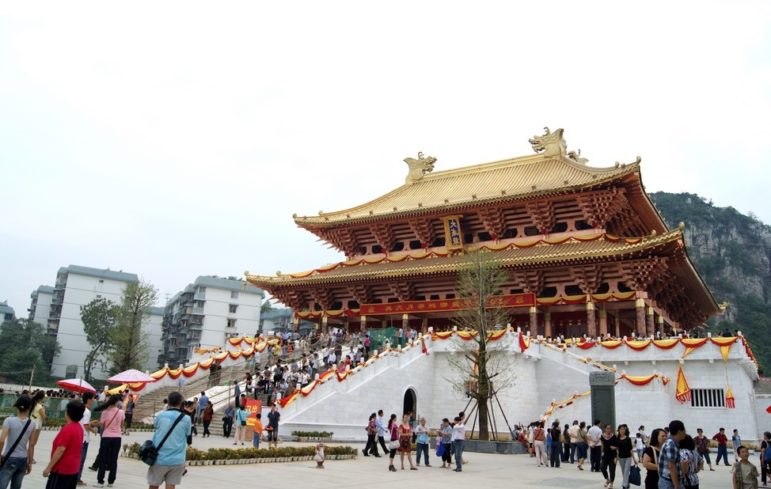Over the past few years, Chinese authorities have been purging the influence of folk religion, which it refers to as xié jiào, sometimes translated as “evil cults.”
Two years ago, local officials in the village of Baofeng in the Chinese city of Gaoyou in Jiangsu province destroyed some 5,911 temples of traditional folk religion.
In 2020, a video emerged showing statues of the Yellow Emperor, Huangdi, being destroyed, apparently because of the Chinese state’s concerns about folk religious practices. Huangdi is the deity of the material world and civility and is the great shaper of society. He is considered the prime initiator of Chinese culture and holds wu (巫) or shamanic sorcery.

Temple of Xuanyuan Huangdi in Xinzheng, Henan Province [“Blowing Puffer Fish,” Wikimedia Commons, CC 2.0]
China’s oppression of folk religions stems from the implementation of Order No. 13, issued by the State Religious Affairs Bureau. Order 13 seeks to standardize the management of religious groups to promote their “healthy development” and “actively guide religion to adapt to a socialist society.” It is part of a plan to subjugate religious practices so they serve the state and ultimately produce and maintain “social harmony.”
As Cathy Sun notes in Harvard Political Review, “China’s persecution of religious minorities is part of a broader, systematic strategy to eradicate external influence in the social and political lives of citizens while harnessing aspects of religion that could serve the state’s interests. Its campaign of religious persecution is a not unprecedented effort to cement public recognition of the state’s authority and thereby generate political conformity.”
Recently, the Chinese government has doubled down on efforts to limit religious expression and ensure that religious activity aligns with state interests. Protestantism, Catholicism, Buddhism, Islam, and Daoism, as regulated by organizations controlled by the Chinese Communist Party, constitute the religions sanctioned by the state in China.
Last year, President Xi Jinping lamented to national CCP leaders that prohibitions against using the Internet to “advertise” religion can be too easily circumvented. He noted that the government must do more to ensure that the Internet and social networks are not used as tools for “religious propaganda.”
In December, the State Administration of Religious Affairs, the National Internet Information Office, the Ministry of Industry and Information Technology, the Ministry of Public Security, and the Ministry of National Security were collectively empowered by new Administrative Measures for Internet Religious Information Services to promote “the unity of safeguarding citizens’ freedom of religious belief and safeguarding national ideological security, the unity of safeguarding the legitimate rights and interests of religious citizens and the practice of socialist core values, the unity of regulating Internet religious information services and the promotion of the healthy inheritance of religion.”
The CCP suggests that the principles described in the measures will protect legality, prevent illegality, curb extremism, help resist infiltration, and combat crime. The measures also stipulate that “online sermons should be organized by religious groups, religious schools, and temples and churches that have obtained the Internet Religious Information Service License.”
The measures came into force on March 1, 2022.
In May, the Tibet Autonomous Region Cyberspace Administration (TARCA) announced that “a special rectification work in the field of online live broadcasting and short videos in the whole region” was needed to confront unspecified “social threats.” The new regulations ferret out activities “undermining national religious policies,” “promoting harmful information about religion,” and “spreading xie jiao and feudal superstitions.” These announcements are consistent with Order 13.
TARCA announced no religion or religious activity will be allowed in order to address the social threats now present in the region through the use of short videos and images. Those who do not have permission to send images or videos are subject to prosecution. The new measures effectively ban, for example, a personal post with the image of the Buddha. The CCP asks anyone coming to such illegal posts on the internet to report them immediately to protect the public’s safety.

Temple of Confucius in Liuzhou, Guangxi [李海斌, Wikimedia Commons, CC 2.0]
In Guangxi last month, the Chinese government increased its surveillance of ethnic Vietnamese groups who speak the Hmong-Mien languages, as well as the Thai-speaking Zhuang, because the state believes they are infiltrating their “folk religion” into Chinese society. They are part of a syncretic faith that includes the worship of the very popular folk hero, Nong Zhigao, who led a revolt for independence against officials, fought against the rich, and protected villagers. Nong Zhigao is now venerated for his willingness to resist aggression and unify his people. Though the Party is aware of his popularity and is cautious to outright eliminating Nong Zhigao’s veneration, the CCP is concerned that such practices could lead to social unrest.
Finally, this week, the deployment of the measures evolved in a new direction. The CCP reportedly assisted elderly citizens in Guangzhou celebreating the 2022 Dragon Boat Festival by warning them against illegal religious activity, xie jiao, and the dangers of superstition. The CCP is concerned that elderly residents waste their money by making donations to religious organizations and temples, or by spending money on superstitious practices. The theme of the campaign was “protecting your pension money.”
In another event, the elderly were warned during a lecture against spending their money on “psychic” practices and the evils of illegal religion.
The CCP asked elderly participants to promise they would stay away from superstition, especially xie jijao and other illegal activities. Before sending them home, the participants were given pamphlets to study at their leisure.
The Wild Hunt is not responsible for links to external content.
To join a conversation on this post:
Visit our The Wild Hunt subreddit! Point your favorite browser to https://www.reddit.com/r/The_Wild_Hunt_News/, then click “JOIN”. Make sure to click the bell, too, to be notified of new articles posted to our subreddit.